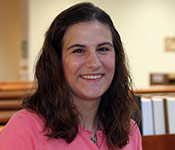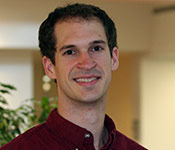Montellese '11 and Weger '11: Finding the Best Ways to Combat Elder Abuse
Jessica Montellese '11
 This summer, Professor Thomas Hafemeister and I are addressing an issue that comes with a very high emotional charge: elder abuse. But as disturbing a problem as elder abuse is, my work with Professor Hafemeister has shown me that it is also a very complex one, requiring much more research than has currently been conducted.
This summer, Professor Thomas Hafemeister and I are addressing an issue that comes with a very high emotional charge: elder abuse. But as disturbing a problem as elder abuse is, my work with Professor Hafemeister has shown me that it is also a very complex one, requiring much more research than has currently been conducted.
Specifically, I have been examining elder abuse in non-institutional settings (i.e. in the elder's home or the home of a caretaker). Many of the societal responses to elder abuse, such as mandatory reporting for physicians or social workers, have evolved from responses that were already in place for child abuse and domestic violence. My task this summer has been to work with Professor Hafemeister on examining these responses and determining whether the child and domestic abuse models are appropriate and useful in their application to elder abuse.
Another related question that we will be addressing this summer is how much self-determination to decline intervention an elder should have when abuse is apparent, and how adult protective services (APS) could be improved to maximize representation and autonomy for competent elders.
Because most incidents of domestic elder abuse are committed by family members, the elder may choose not to avail him or herself of more invasive remedies, such as criminal prosecution, or may prefer no intervention at all. My work this summer is focused on striking a balance between protecting vulnerable elders from domestic elder abuse and allowing for self-determination when a competent elder would decline APS services.
In addition to gaining an in-depth understanding of the complex issues involved in elder abuse responses, I am also garnering valuable research and writing skills. I have no doubt that being involved in the process of writing a manuscript on a topic that I am passionate about, from initial brainstorming to final editing, will prove to be an extremely valuable experience — one that will serve me well throughout law school and into my career.
 Matt Weger '11
Matt Weger '11
Financial abuse or exploitation of the elderly is a rapidly emerging problem for a society in which the size of its elder population continues to grow and whose increased wealth makes them an attractive target for exploitation. I have spent the summer with Professor Thomas Hafemeister conducting research on this problem and examining and crafting possible means for redressing it.
Although traditional suits to impose civil or criminal liability on someone who has exploited someone are available as a remedy, they are seldom employed with regard to elders as they may be unavailable or ineffective as a witness because they are infirm (or in some cases deceased by the time the matter comes to trial) or because they are unwilling to participate in the proceedings.
As a possible alternative, we have explored the application of a remedy employed in other contexts involving relationships where one party was highly vulnerable and dependent on another for assistance. Professor Hafemeister suggested that perhaps the fiduciary duty doctrine might be more readily applicable to financial abuse of the elderly in light of the relative vulnerability of the elderly and the trust they often place in individuals to manage their financial affairs. As a result, I have been examining this doctrine to determine whether it could be successfully applied when someone has financially exploited an elder. Subsequently, I have explored cases and commentary discussing fiduciary duties in general and the various scenarios whereby someone may assume control over financial decision making for an elder, such as through a power of attorney. I have also ascertained that there is a potential parallel between the imposition of this fiduciary duty and the duty-to-rescue in tort.
It has been an incredibly stimulating and rewarding assignment. I have been encouraged to create and develop legal arguments detailing why fiduciary doctrine might be applicable in this context. Furthermore, I intend to continue working with Professor Hafemeister on this problem during the next semester as part of an independent research project.
Founded in 1819, the University of Virginia School of Law is the second-oldest continuously operating law school in the nation. Consistently ranked among the top law schools, Virginia is a world-renowned training ground for distinguished lawyers and public servants, instilling in them a commitment to leadership, integrity and community service.


